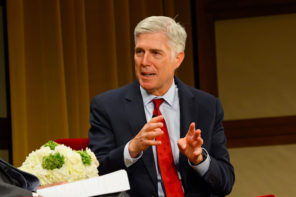If I didn’t know better I would think that an establishment called The Hitching Post was more likely to be an old-time saloon than the newest front in the religious exemption wars. But that just goes to show I don’t appreciate a good pun when I see one, because The Hitching Post is, in fact, the name of a for-profit wedding chapel in Coeur d’Alene, Idaho, that has found itself in the midst of the heated debate over religious exemptions and same-sex marriage.
Or it might be more accurate to say it’s been shoved into the middle of that debate by the Alliance Defending Freedom, the conservative impact litigation organization, which filed suit on behalf of the Knapps (owners of the Hitching Post) soon after the Ninth Circuit overturned Idaho’s marriage ban, even though no enforcement action against the Knapps had been taken (or even threatened).
Much has already been written about the Hitching Post’s lawsuit, and in particular the bizarre white-washing—or maybe Christian-washing—that is evident when one compares screen grabs of the company’s website only a few weeks ago with its current incarnation. It’s obvious why this troubles us on a practical, human level—it suggests that the apparently newfound commitment to officiating only cross-sex Christian marriages is really just a convenient mask for homophobia, and that the Knapps only discovered their newfound devotion when gay marriage became the law of their land.
But there’s another reason it should trouble us—at least those of us with an interest in how the law deals with these questions—regardless of whether or not the Hitching Post gets its exemption or not. And that’s because the doctrine as it currently exists doesn’t have a good way of taking account of these kinds of facts. There was a similar pattern in Hobby Lobby, where it became apparent that (1) Hobby Lobby had covered contraception in its health plan until the ACA was passed requiring it to do so, which was the first point at which anyone apparently thought to check on whether they covered it, and (2) even after the lawsuit it continues to invest money in its 401k plans in the companies that manufacture the types of contraception to which it religiously objects.
None of this made it into the opinion though, because as current doctrine stands, courts are loath to consider the “sincerity” of a plaintiff’s religious beliefs. Whether or not we should question a plaintiff’s sincerity qua sincerity is a question I’ll leave for another time But I think these kinds of cases get at a different but related issue—that maybe when we talk about sincerity we’re not talking so much about your belief at a given moment, but about whether you’re acting the way we think someone with your beliefs should act.
In other words, are you acting in a way that is consistent with your beliefs as you yourself have expressed them? Courts may be unable to plumb the depths of a man’s soul, but they can certainly compare his (or her) past behavior to his (or her) current statements, and see if there is any contradiction between them. In other legal contexts courts have to compare actions to statements and interpret intentions as a routine matter.
I’m not necessarily saying that’s the approach the doctrine should take—this is a question I’m currently thinking and starting to write about in my own academic work, and I don’t have a clear answer yet. But I think that sense of discord—between what a plaintiff says he or she believes and what his or her actions suggest—gets at what many people find so infuriating about this kind of contrast. And sometimes that indignation is a good indication that the law is missing an important part of the story.





